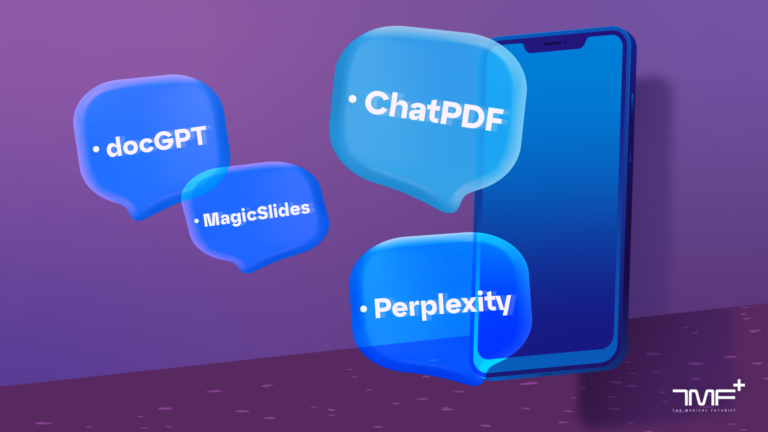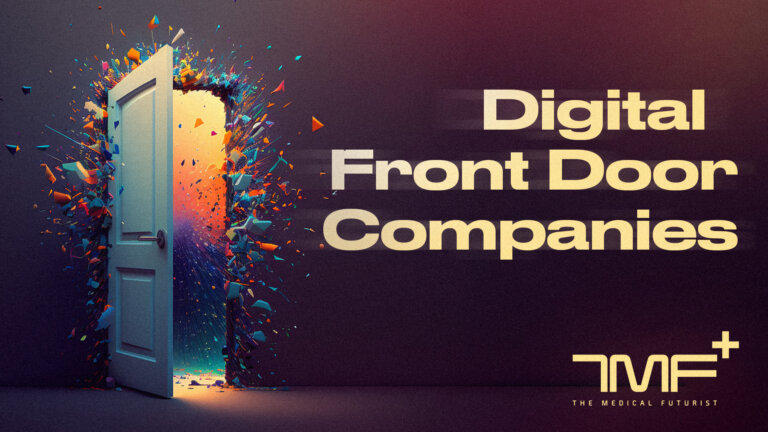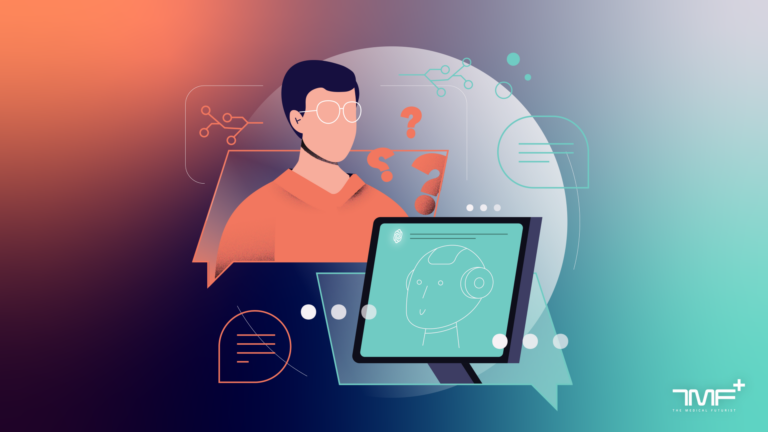Navigating AI in medicine and digital health can feel like ordering a coffee at that new hipster café downtown: exciting yet slightly overwhelming with a menu that seems to be in a different language. A while ago we published a buzzword dictionary to help you decode the most frequently repeated terms. Back then artificial intelligence and machine learning were rarely heard exotic expressions, but as quite a few years have passed, a whole new set of mambo-jambo emerged, waiting to be explained.
Generative AI, aka GenAI
The wunderkind of the past year, generative AI goes beyond simple automation, venturing into the world of creation. This term refers to a category of AI algorithms that look for patterns and structures in the sample data and develop new ones. For example, it can simulate discussions and learn how we, people, would be satisfied with the results. But it does it billions of times a day. So it improves at an unbelievable rate.
Large Language Models, aka LLMs
Large Language Models (LLMs) are a subset of Generative AI. While the former refers to any AI system that can create or generate new content, LLMs specifically focus on generating and understanding human language and producing human-like text.
Value-Based Care
This concept aims to change the workings of healthcare systems to focus on quality and not quantity. Or, using a profane metaphor: making medicine less like a fast-food chain, serving as many as possible, as quickly as possible, and more like a Michelin-starred restaurant, where the quality of your experience is paramount.
Digital Front Door or DFD [Companies]
A “digital front door” company is a healthcare technology provider that helps patients access healthcare services through a single, user-friendly platform.
Virtual Wards
A virtual ward is a solution that supports patients who would otherwise be in the hospital to get acute care, remote monitoring, and treatment in their own homes, with the use of digital, remote monitoring health tools relaying real-time data to the hospital.

Virtual First
Originating from the tech industry, “virtual first” refers to experiencing a service primarily virtually or remotely rather than through a traditional centralized physical location.
Imageomics
This new science discipline lies at the intersection of medical imaging and big data analytics. Imageonics is the Sherlock Holmes of healthcare, deducing vital clues about a patient's health from medical images.
Radiomics
Similarly to imageomics, radiomics also comes from the advanced intersections of medical imaging and data analysis, but the latter focuses on slightly different aspects and scopes within this field.
Theranostics
Theranostics is a portmanteau of “therapy” and “diagnostics.” This field is revolutionizing how we approach diseases, particularly cancer, by combining diagnostic testing with targeted therapy based on the test results.
Is there anything else you often come across in the digital health or AI in medicine realm and don't really understand? Let us know, we are always happy to help!
The post Technobabble To English: A Buzzword Guide For Medical AI And Digital Health appeared first on The Medical Futurist.

Frequently Asked Questions
Why is holistic healing better?
Holistic health care treats the whole person instead of just specific symptoms. This involves looking at how someone feels about their body, their diet, where they live, and how much stress they have.
Holistic medicine considers all aspects of a patient's life and treats them as a complete package. This may sound simple but it is not easy to practice. Most doctors are focused on the physical side.
Who uses holistic medicine?
Holistic medicine is a holistic approach to healthcare that treats the whole person, not just specific symptoms. It focuses on both the mental and physical aspects of well-being.
Holistic medicine includes acupuncture, massage therapy, chiropractic treatment, nutritional counseling, yoga, and other complementary therapies.
People who use holistic medicine include those who have been diagnosed with cancer, heart problems, diabetes, arthritis, depression, anxiety, chronic fatigue syndrome, fibromyalgia, attention deficit hyperactivity disorder (ADHD), multiple sclerosis, Alzheimer's disease, Parkinson's disease, post-traumatic stress disorder, eating disorders, migraines, infertility, menopause, asthma, autism, and many others.
How safe are holistic medicines?
Holistic medicines can be safe as they don't contain harmful drugs and are natural remedies that people have used for centuries.
They have been proven to be effective in treating many diseases, including asthma, arthritis, chronic pain, diabetes, high blood sugar, heart disease and obesity, as well as anxiety, stress.
Holistic medicines are also used by millions of people around the world who suffer from various kinds of diseases. They include homeopathy. Chiropractic care, herbal therapies, massage therapy. yoga. meditation. Biofeedback. These therapies address the whole person instead of just the symptoms.
Statistics
- According to a 2005 book by a US [116]Institute of Medicine panel, the number of RCTs focused on CAM has risen dramatically. (en.wikipedia.org)
- A 15-year systematic review published in 2022 on the global acceptance and use of CAM among medical specialists found the overall acceptance of CAM at 52% and the overall use at 45%. (en.wikipedia.org)
- The use of alternative medicine in the US has increased, with a 50 percent increase in expenditures and a 25 percent increase in the use of alternative therapies between 1990 and 1997 in America. (en.wikipedia.org)
- These studies found that 38.4% concluded positive or possibly positive effects for CAM (12.4%), 4.8% concluded no effect, 0.7% concluded harmful effects, and 56.6% concluded insufficient evidence. (en.wikipedia.org)
- In the 17% in which they disagreed, a third reader agreed with one of the initial readers to set a rating. (en.wikipedia.org)
External Links
webmd.com
doi.org
ncbi.nlm.nih.gov
- BIOFEEDBACK TRAINING AND TENSION-TYPE HEADACHE – PubMed
- The Effect of Foot Reflexology on Hospital Anxiety and Depression in Female Older Adults: a Randomized Controlled Trial – PubMed
nccih.nih.gov
- Statistics on Complementary Health Approaches and Integrative Healthcare
- How do you name complementary, alternative, or integrative health?
How To
What is it that holistic doctors do that traditional doctors don't?
A holistic doctor offers more services than a traditional physician, such as a nutritionist and massage therapist, as well as naturopaths, homeopaths, and naturopaths.
A holistic doctor works with patients holistically – they look at the whole person, their lifestyle, and environment and address the root cause of any health issues rather than just treating symptoms. This helps them to identify the root cause of any health issues and help with long-term wellness. Holistic doctors may use alternative medicine, including essential oils and herbs. They can also offer nutritional advice and support healthy living.
Additionally, holistic doctors offer treatments such as reflexology, massage, shiatsu and acupuncture.
–
——————————————————————————————————————————————
This blog is a source of general information and discussion on health and related topics. Information and materials on this blog, on the website, or in any of the connected materials are not intended to replace or used as a substitute for the advice of a medical professional, diagnosis, or treatment. This blog does not represent the application of any nursing, medical or other health professional advice or diagnosis. We are unable to diagnose health conditions, offer second opinions or provide specific treatment recommendations via this blog or on our website.
If you or another person is suffering from a medical issue and you are concerned, consult your doctor or seek out other medical professional treatment as soon as possible. Do not disregard medical advice from a professional or delay seeking it due to information you seen on the blog or website or in any of the linked materials. If you're experiencing an emergency medical situation, dial 911 or seek emergency medical assistance on the closest phone immediately.
——————————————————————————————————————————————
By: Andrea Koncz
Title: Decoding Medical AI and Digital Health Jargon
Sourced From: medicalfuturist.com/technobabble-to-english-a-buzzword-guide-for-medical-ai-and-digital-health
Published Date: Thu, 04 Apr 2024 07:30:00 +0000
Frequently Asked Questions
Why is holistic healing better?
Holistic health care treats the whole person instead of just specific symptoms. This involves looking at how someone feels about their body, their diet, where they live, and how much stress they have.
Holistic medicine considers all aspects of a patient's life and treats them as a complete package. This may sound simple but it is not easy to practice. Most doctors are focused on the physical side.
Who uses holistic medicine?
Holistic medicine is a holistic approach to healthcare that treats the whole person, not just specific symptoms. It focuses on both the mental and physical aspects of well-being.
Holistic medicine includes acupuncture, massage therapy, chiropractic treatment, nutritional counseling, yoga, and other complementary therapies.
People who use holistic medicine include those who have been diagnosed with cancer, heart problems, diabetes, arthritis, depression, anxiety, chronic fatigue syndrome, fibromyalgia, attention deficit hyperactivity disorder (ADHD), multiple sclerosis, Alzheimer's disease, Parkinson's disease, post-traumatic stress disorder, eating disorders, migraines, infertility, menopause, asthma, autism, and many others.
How safe are holistic medicines?
Holistic medicines can be safe as they don't contain harmful drugs and are natural remedies that people have used for centuries.
They have been proven to be effective in treating many diseases, including asthma, arthritis, chronic pain, diabetes, high blood sugar, heart disease and obesity, as well as anxiety, stress.
Holistic medicines are also used by millions of people around the world who suffer from various kinds of diseases. They include homeopathy. Chiropractic care, herbal therapies, massage therapy. yoga. meditation. Biofeedback. These therapies address the whole person instead of just the symptoms.
Statistics
- According to a 2005 book by a US [116]Institute of Medicine panel, the number of RCTs focused on CAM has risen dramatically. (en.wikipedia.org)
- A 15-year systematic review published in 2022 on the global acceptance and use of CAM among medical specialists found the overall acceptance of CAM at 52% and the overall use at 45%. (en.wikipedia.org)
- The use of alternative medicine in the US has increased, with a 50 percent increase in expenditures and a 25 percent increase in the use of alternative therapies between 1990 and 1997 in America. (en.wikipedia.org)
- These studies found that 38.4% concluded positive or possibly positive effects for CAM (12.4%), 4.8% concluded no effect, 0.7% concluded harmful effects, and 56.6% concluded insufficient evidence. (en.wikipedia.org)
- In the 17% in which they disagreed, a third reader agreed with one of the initial readers to set a rating. (en.wikipedia.org)
External Links
webmd.com
doi.org
ncbi.nlm.nih.gov
- BIOFEEDBACK TRAINING AND TENSION-TYPE HEADACHE – PubMed
- The Effect of Foot Reflexology on Hospital Anxiety and Depression in Female Older Adults: a Randomized Controlled Trial – PubMed
nccih.nih.gov
- Statistics on Complementary Health Approaches and Integrative Healthcare
- How do you name complementary, alternative, or integrative health?
How To
What is it that holistic doctors do that traditional doctors don't?
A holistic doctor offers more services than a traditional physician, such as a nutritionist and massage therapist, as well as naturopaths, homeopaths, and naturopaths.
A holistic doctor works with patients holistically – they look at the whole person, their lifestyle, and environment and address the root cause of any health issues rather than just treating symptoms. This helps them to identify the root cause of any health issues and help with long-term wellness. Holistic doctors may use alternative medicine, including essential oils and herbs. They can also offer nutritional advice and support healthy living.
Additionally, holistic doctors offer treatments such as reflexology, massage, shiatsu and acupuncture.

